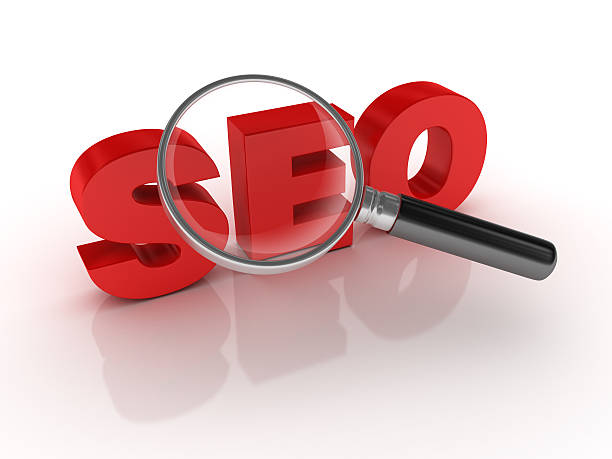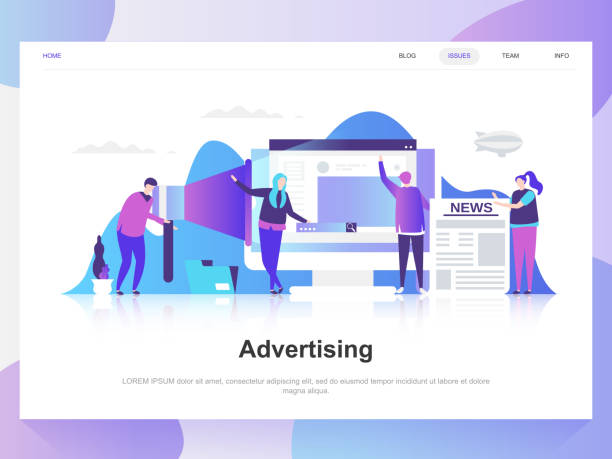What is SEO and why is it vital for your business?

In today’s digital world, #visibility and #being_seen on the internet are of particular importance; especially when millions of people daily refer to search engines like Google to find the products, services, or information they need.
SEO or Search Engine Optimization, is a strategic process that helps your website achieve a higher ranking in the organic (non-paid) search results of search engines.
This higher ranking means attracting more visitors, increasing brand awareness, and ultimately, sustainable growth and profitability for your business.
Imagine your website is on the second or third page of search results; statistically, a very small percentage of users even go to the second page, let alone subsequent pages.
But by applying correct and continuous SEO principles, you can ascend to the first page of Google and drive more targeted and high-quality traffic to your website.
This process is not just about intelligently placing keywords, but also involves comprehensively improving user experience (User Experience – UX), increasing site loading speed, and building domain authority and trust from the perspective of search engines.
SEO is a complex, multifaceted, and continuous process that requires specialized knowledge and continuous updates; because search engine algorithms are constantly changing and evolving.
A correct and deep understanding of the concept of SEO is the first and most important step for implementing an effective and sustainable strategy.
This article provides an explanatory and comprehensive approach to understanding the different dimensions of SEO and how to use it to ensure your online success.
This comprehensive guide helps you get acquainted with the basic and advanced principles and techniques of SEO and prepare your website to achieve the best results in search engines.
Continuous optimization for SEO not only means attracting more traffic and increasing sales, but also significantly helps in increasing credibility, user trust, and creating a strong and recognized brand in the digital space.
Achieving high rankings in search results is equivalent to having a permanent and highly-visited storefront for your business.
Is your company’s website performing as well as your brand deserves? In today’s competitive world, your website is your most important online tool. Rasawab, a specialist in professional corporate website design, helps you to:
✅ Gain customer credibility and trust
✅ Convert website visitors into customers
⚡ Get a free consultation!
Keyword Research; The Cornerstone of Every Successful SEO Strategy

#Keyword_research, without a doubt, is the starting point and the most vital stage in formulating any successful SEO campaign.
Without accurately identifying the words and phrases your target audience enters into search engines to find the products, services, or information you offer, all your subsequent SEO efforts might go astray and not yield the desired results.
This comprehensive process includes various stages such as finding, deep analysis, and ultimately, selecting the best and most effective keywords that have the greatest potential to attract organic, relevant, and targeted traffic to your website.
Keywords can be divided into two main categories: “Short-tail” and “Long-tail”.
Short-tail keywords are very general and broad (like “shoes“ or “clothes“) and typically have a high search volume, but competition for them is very intense.
In contrast, long-tail keywords are more specific and have a clearer user intent (e.g., “Nike men’s running shoes size 42 for running“).
Although the search volume for long-tail keywords is lower, their conversion rate is usually higher because the user knows exactly what they want.
To effectively perform this part of SEO, the use of specialized tools such as Google Keyword Planner, Ahrefs, Semrush, and Moz Keyword Explorer is essential.
These tools help you identify search volume, competition level, and related keywords.
A key and vital guidance in keyword research is to pay special attention to user intent, in addition to search volume statistics.
Is the user looking for information (informative), intending to buy a product or service (transactional), or searching for a specific website (navigational)? Accurately understanding these intents helps you produce content that precisely matches user needs and expectations and significantly increases your chances of ranking in SEO results.
This part of SEO is a specialized and fundamental stage that requires accuracy, deep analysis, and strategic thinking.
A strong and intelligent keyword strategy forms the foundation of all subsequent SEO activities, and without it, other efforts may not bear fruit.
Optimizing for the right keywords allows your website to stand out among numerous competitors and attract quality traffic, which directly impacts the success of your overall SEO strategy.
On-Page SEO Techniques for Improving Content and Site Structure

#On_Page_SEO refers to a set of optimizations and actions performed directly within your website to improve its ranking in search engines and enhance user experience.
This vital part of SEO involves precise optimization of content, HTML elements, and the overall structure of your website.
Key elements of on-page SEO include: correct and natural use of keywords in the page title (<title> tag), which is the first thing a user sees in search results; meta descriptions, which provide an attractive summary of the page’s content and encourage clicks; intelligent use of heading tags (H1-H6) for content structuring and improved readability; and naturally and relevantly embedding keywords in the main text of the content.
Ensure that your content is educational, comprehensive, and valuable, and answers all potential user questions about the page’s topic.
For example, the H1 heading should include the main and descriptive keyword, while subheadings (H2, H3, etc.) help divide the content into logical sections and assist search engines in understanding your content structure.
Optimizing images by using descriptive alt tags (Alt Text) that explain the image content for search engines and visually impaired users, as well as ensuring high page loading speed, are among other important factors in on-page SEO.
Creating internal links (internal links) that connect related and supplementary pages of your website to each other not only helps search engines better understand your page structure and hierarchy, but also significantly improves user navigation experience and increases user dwell time on the site.
Using descriptive, short, and relevant keyword-containing URLs is also highly important as it provides information about the page’s content to both search engines and users.
These explanatory and practical approaches help you ensure that every page of your website is optimized and has maximum potential for ranking.
Focusing on the quality and value of content for the user, rather than merely keyword density, is a fundamental principle of on-page SEO.
This part of SEO directly impacts the quality, relevance, and presentation of your content to user searches and plays a significant role in satisfying search engines and users.
| On-Page SEO Factor | Explanation and Role in Optimization | Level of Importance |
|---|---|---|
| Title Tag | The most important element for search engines to understand the page topic and the first thing a user sees in the SERP; must include the main keyword. | High (Crucial) |
| Meta Description | An attractive and persuasive summary for the user displayed below the title in search results; directly impacts Click-Through Rate (CTR). | Medium (Important for CTR) |
| Heading Tags (H1-H6) | For structuring content, improving readability, and helping search engines understand information hierarchy; H1 should include the main keyword. | High (For Structure and Readability) |
| Image Optimization (Alt Text) | Explains image content for search engines and visually impaired users; also helps improve ranking in image search. | Medium (For Accessibility and Images) |
| Internal Links | Connecting related website pages to each other, improving Link Equity flow and user navigation on the site. | High (For Crawlability and User Experience) |
| Page Load Speed | A crucial factor for user experience and Google ranking; slow pages lead to high bounce rates and lower rankings. | High (Crucial for UX and Ranking) |
| Content Quality and Depth | Providing comprehensive, unique, and valuable content that answers user needs and engages them. | High (Fundamental) |
Technical SEO; Ensuring Correct Site Crawling and Indexing

#Technical_SEO refers to a set of technical aspects of your website that directly affect its crawlability and indexability by search engines.
This part of SEO is so fundamental that without a strong technical foundation, even the best content and strongest link-building strategies might never be discovered, understood, or ranked by search engines.
Technical SEO involves ensuring your website has a proper structure for search engine robots to crawl; meaning all important pages are accessible and available to the robots without hindrance.
Correctly configuring the Robots.txt file, which tells search engines which parts of the site to crawl and which to ignore, as well as an XML Sitemap, which provides a list of all important pages on the site to the engines, are among the basic actions in this area.
Furthermore, mobile-friendliness and high page loading speed, especially on mobile devices, are of paramount importance, as Google has adopted a “mobile-first indexing” approach for years.
Technical SEO also addresses issues such as using an SSL certificate (HTTPS) for website security, removing or properly managing duplicate content using canonical tags, and fixing common errors like 404 errors (page not found) and correctly managing 301 redirects for moved or deleted pages.
Optimizing URL structure and site information architecture also plays a significant role in technical SEO, as these help users and search engines better understand your site’s structure and content.
This part of SEO requires deep specialized knowledge in web design, programming, and server configuration.
A website with a strong technical infrastructure not only helps search engines correctly understand and index your content, but also provides a better user experience, which is itself an important ranking factor.
This part of SEO acts as the backbone of your online presence, and without it, other efforts to optimize the website may not be effective enough and may even fail.
Therefore, investing in technical SEO is essential for any website seeking long-term and sustainable success in search results.
Are you bothered by losing customers who visited your site to buy?
Rasawab is your specialized solution for having a successful online store.
✅ Significantly increase your online sales
✅ Build strong branding and customer trust⚡ Get a free consultation from Rasawab experts!
Off-Page SEO and the Importance of Link Building

#Off_Page_SEO refers to all actions and activities performed outside your website, but whose ultimate goal is to improve your website’s ranking and authority in search engines.
The most important and influential factor in off-page SEO is link building.
Backlinks, or links pointing from other websites to your site, are considered “votes of confidence” or “references” by search engines, especially Google.
The more backlinks you have from reputable, relevant, and high-quality websites, the more authoritative, trustworthy, and higher domain authority search engines will consider your website, which directly impacts your ranking.
But the key point is that it’s not just about the quantity of links; the quality and thematic relevance of the linking website (Domain Authority and Relevance) are far more important than the mere number of backlinks.
Successful and ethical link-building strategies include creating very high-quality and unique content that naturally encourages sharing and attracts links, establishing relationships with relevant websites, bloggers, and influencers in your field of activity, and publishing deep analytical, news-related, or research content that is recognized as a reference source.
Active and strategic presence on social media networks and sharing your content on these platforms also indirectly helps with off-page SEO, although social media links are generally not considered direct ranking factors.
Participating in specialized forums and communities relevant to your industry, answering questions, and providing value can create valuable opportunities for natural link building and increasing brand credibility and recognition.
This part of SEO requires patience, continuous effort, and a long-term approach, and its results usually appear in the long run.
Strictly refrain from using Black Hat SEO link-building techniques such as mass buying low-quality backlinks or unnatural link exchanges, which can lead to your website being penalized by Google.
Optimizing your Google My Business profile is also an important aspect of local SEO within off-page SEO, which is particularly crucial for physical businesses.
Content Strategy for SEO; Producing Valuable and Engaging Content

#Content_Strategy is, without a doubt, the heart and soul of any successful SEO campaign, and without it, other efforts may remain fruitless.
Search engines, especially Google, are increasingly focusing on providing the most relevant, high-quality, and useful content to their users.
Therefore, producing content that is truly valuable, informative, and engaging for your target audience not only significantly improves your ranking in search results but also increases user engagement and builds their loyalty to your brand.
Content can take various forms such as educational articles and guides, in-depth blog posts, visual infographics, explanatory videos, audio podcasts, and even interactive tools.
The important thing is that your content is engaging content that provides answers; meaning it addresses common questions and main concerns of users, effectively solves their problems, and offers deep and practical information that cannot be found elsewhere.
Keyword usage in content must be completely natural and within the correct semantic context, and excessive repetition of keywords (Keyword Stuffing) should be avoided, as this action not only harms user experience but can also lead to penalties from Google’s algorithms and seriously damage your SEO.
Your main goal should be to provide an entertaining, informative, and comprehensive experience for the reader or viewer.
Regularly updating old content and adding new and relevant information also signals to Google that your website is active, dynamic, and a reliable and up-to-date source.
Furthermore, creating comprehensive “Pillar Content” that addresses main and broad topics in your field and connects to more specific and detailed sub-content via internal links is a powerful SEO strategy.
This approach helps guide users on your website, increases your credibility as an expert, and demonstrates that you are a reliable and comprehensive resource in your field.
Ultimately, the quality, relevance, and value of content for user search intent are the most important factors in SEO ranking today and in the future.
Measuring SEO Success; Tools and Data Analysis

After implementing and executing SEO strategies, the vital stage of #monitoring and #performance_measurement arrives.
This stage is crucial for evaluating the effectiveness of your efforts, identifying strengths and weaknesses, and continuously optimizing your SEO strategy.
The measurement process includes continuous tracking of key performance indicators (KPIs) such as keyword rankings for target phrases, organic traffic to the website, bounce rate (which indicates user retention on the site), click-through rate (CTR) in search results, and most importantly, conversion rates, which can include sales, contact form submissions, or resource downloads.
Free and powerful tools like Google Search Console and Google Analytics are essential for this purpose and should be used regularly.
Google Search Console provides you with precise and valuable information about how your site is crawled and indexed by Google, potential site errors, keywords users have used to find you (even if they appear as “not provided“ in Analytics), and the status of your backlinks.
Google Analytics also provides detailed data on user behavior on your site, such as pages visited, time spent on each page, user navigation paths, and their traffic source.
In addition to these free tools, using paid and more advanced analytical tools like Ahrefs and Semrush can provide deeper and more comprehensive insights into your SEO performance, competitor strategy analysis, identifying new keyword and backlink opportunities, and evaluating the overall health of your website.
Precise and continuous analysis of this data helps you optimize your SEO strategy, quickly identify and address weaknesses, and discover new opportunities for growth and improvement.
A successful SEO strategy is never static, but is based on data, continuous analysis, and an educational and adaptive approach.
Without precise measurement and data-driven feedback, you cannot know which parts of your SEO efforts are effective and which need improvement and a change of approach.
This continuous process of measurement and improvement is the key to maintaining and enhancing your ranking in search results and achieving your online business goals.
| SEO Tool | Main Application | Trackable Metrics |
|---|---|---|
| Google Search Console | Direct monitoring of site performance in Google search, crawling and indexing, and identifying technical issues. | Search traffic, impressions and clicks, keywords, crawl errors, backlinks |
| Google Analytics | Comprehensive analysis of user behavior on the website, traffic sources, and conversion rates. | Traffic, dwell time, bounce rate, user path, conversions, demographics |
| Google Keyword Planner | Discovering new keywords and analyzing search volume and competition level for content planning. | Search volume, keyword competition, keyword suggestions |
| Ahrefs / Semrush | In-depth competitor analysis, backlink profile, keyword rankings, and overall site health monitoring. | Domain Authority, competitor traffic, backlinks, keyword rankings |
| PageSpeed Insights | Analyzing and optimizing website page loading speed for desktop and mobile. | Speed score, Core Web Vitals metrics, optimization suggestions |
Local SEO and Mobile SEO; Two Key Factors in the New Era of Search

In recent years, with the significant growth in the use of mobile phones for accessing the internet and searching for information, #Local_SEO and #Mobile_SEO have become two very important and inseparable aspects of SEO strategies.
With the increase in “near me” searches and searches performed by users on the go to find physical locations, optimization for these two areas is of high importance and can bring a lot of traffic and potential customers to businesses.
Local SEO helps businesses that offer their services or products in a specific geographical area (such as a city or neighborhood) appear in local search results like the Google Local Pack or Google Maps.
For success in local SEO, completing and precisely optimizing your Google My Business (GMB) profile with complete and accurate information, actively collecting and responding to positive customer reviews, and ensuring consistency and uniformity of business information (NAP – Name, Address, Phone) across the web (in online directories and social media) are among the most important actions.
These factors help Google understand the credibility and relevance of your business to local searches.
On the other hand, mobile SEO means fully optimizing your website for mobile device users.
Given that a significant portion of search traffic currently comes from mobile, Google has adopted a “Mobile-First Indexing” approach.
This means that Google considers the mobile version of your site as the primary and reference version in its crawling and indexing process.
Therefore, ensuring responsive website design (which automatically adjusts to the user’s device screen size), high mobile page loading speed (which is vital for user experience and ranking), and providing a smooth and flawless user experience across various mobile devices are among the critical factors in mobile SEO.
These aspects of SEO require specialized and continuous attention to ensure your website is resilient to changes in Google’s algorithms and can continue to attract targeted traffic, as a lack of mobile optimization can lead to a significant drop in ranking and the loss of a large portion of the audience.
Does your current e-commerce site design lead to losing customers and sales?
Rasawab is your solution with modern and user-friendly e-commerce website designs!
✅ Significantly increase conversion rates and sales
✅ Build strong branding and gain customer trust
⚡ Get a free e-commerce website design consultation from Rasawab!
Google Algorithm Updates and the Importance of News SEO

The world of #SEO is constantly changing and evolving, and search engine ranking algorithms, especially Google’s algorithms, are continuously and rapidly updated.
These updates, some of which are minor and some major and impactful (such as Core Updates, formerly known as Panda, Penguin, Hummingbird), can significantly affect website rankings, organic traffic, and ultimately, business revenue.
Therefore, for every SEO specialist and website owner, actively following SEO news and quickly becoming aware of the latest changes, trends, and best practices in the SEO industry is vital and undeniable.
Reputable sources such as the official Google Search Central Blog, leading industry websites like Search Engine Journal, Search Engine Land, Moz, and Ahrefs provide important and in-depth news and analyses in this area, which are essential to study to stay up-to-date.
Precisely understanding these updates helps you adjust your SEO strategy in a timely manner and in accordance with new changes, preventing sudden drops in ranking or potential penalties.
Furthermore, the concept of News SEO refers to optimizing news content for display in Google’s “News” section or Google News.
This particular type of SEO requires high publication speed, credibility and authority of the news source, and strict adherence to Google’s specific guidelines for news content (such as using Schema Markup for news, regular publication, and creating a dedicated XML News Sitemap).
Given the importance of speed and accuracy in news publication, and fierce competition in the media space, websites operating in the fields of media, journalism, or news publishing must pay special attention to this section of SEO to remain at the top of news results and attract significant traffic through Google News.
Ultimately, a proactive approach and adaptability to changes are the cornerstones of success in SEO.
The Future of SEO and Common Optimization Mistakes

#Future_of_SEO and #Common_mistakes are two important and complementary aspects for anyone seeking long-term and sustainable success in the online world.
The future of SEO is closely tied to advancements in Artificial Intelligence (AI), Machine Learning, and new technologies such as Voice Search and Visual Search.
Search engines are becoming smarter every day, better able to understand user intent, Natural Language Processing (NLP), and provide more precise and comprehensive answers.
This means that SEO is no longer just about keyword inclusion, but about providing the best, most comprehensive, and most relevant answer and experience to the user.
Optimizing for voice search, where users ask questions conversationally, creating engaging content and conversational content that directly answers specific questions, and focusing on proper use of structured data (Schema Markup) to help search engines better understand your content, are important future trends in SEO.
On the other hand, awareness of common SEO mistakes can prevent wasted time, resources, and even damage to your website’s reputation.
These common mistakes include: excessive and unnatural use of keywords (keyword stuffing), buying low-quality backlinks or using unnatural link-building networks, neglecting site speed and mobile user experience (which are now primary ranking factors), not regularly updating content and publishing outdated and valueless content, and not continuously analyzing SEO data and ignoring insights from analytical tools.
To avoid these mistakes and achieve success in SEO, it is necessary to have an educational and comprehensive approach, continuously update your knowledge and skills, and adjust your strategies based on the latest algorithm changes and market trends.
SEO is a long-term investment that, with patience, knowledge, precise analysis, and continuous effort, can bring significant results for your business and help you achieve your online goals, from increasing traffic and visibility to sales growth and brand reputation.
Frequently Asked Questions
| Question | Answer |
|---|---|
| What is SEO? | SEO, or Search Engine Optimization, is a process for increasing the quality and quantity of website traffic by improving the site’s ranking in natural (organic) search results of search engines like Google. |
| What are the main types of SEO? | SEO is divided into three main categories: On-Page SEO, Off-Page SEO, and Technical SEO. |
| What does On-Page SEO include? | On-Page SEO includes optimizing elements within the website, such as keywords, page title (Title Tag), meta description, content, URL structure, images, and internal links. |
| What is Off-Page SEO? | Off-Page SEO refers to activities outside the website that help improve its ranking, such as backlink building, social media marketing, and brand mentions. |
| What is Technical SEO? | Technical SEO deals with optimizing the technical aspects of a website to help it be crawled and indexed better by search engines. This includes site speed, mobile-friendliness, site structure, Sitemaps, and the Robots.txt file. |
| What role do Keywords play in SEO? | Keywords are phrases that users enter into search engines. Correct and targeted use of relevant keywords in content and site elements helps search engines understand your page’s topic and display it for relevant searches. |
| What is a Backlink and why is it important? | A backlink, or inbound link, is a link from one website to another. Backlinks act as a “vote of confidence” from other sites for search engines and play a significant role in a site’s credibility and ranking, especially if they are from reputable sites. |
| What impact does quality content have on SEO? | High-quality, relevant, comprehensive, and unique content not only attracts and retains users but also shows search engines that your page is valuable. This helps improve ranking, reduce bounce rate, and increase user time on site. |
| Why is site loading speed important for SEO? | Site loading speed is a crucial ranking factor for Google. Faster sites offer a better user experience, have lower bounce rates, and are preferred by search engines. |
| Is SEO a one-time process? | No, SEO is a continuous and long-term process. Search engine algorithms are constantly changing, competition is increasing, and site content also needs updating. Therefore, SEO requires continuous monitoring, analysis, and optimization. |
And other services of RasaWeb Advertising Agency in the field of advertising
Smart Custom Software: Professional optimization to increase website traffic using Google Ads management.
Smart Marketplace: A new service for increasing online growth through the use of real data.
Smart Website Development: An effective tool for analyzing customer behavior with the help of Google Ads management.
Smart Sales Automation: A fast and efficient solution for campaign management focusing on marketing automation.
Smart Social Media: A dedicated service for growth in sales increases based on SEO-driven content strategy.
And over hundreds of other services in the field of internet advertising, advertising consultation, and organizational solutions.
Internet Advertising | Advertising Strategy | Advertorial
Sources
The Importance of SEO
SEO for Online Businesses
Google Ranking Guide
SEO Success Tips
? With Rasaweb Afarin, the future of your business in the digital world is guaranteed! With our expertise in providing comprehensive digital marketing solutions, including corporate website design and advanced SEO strategies, we revolutionize your online presence and accompany you on the path to sustainable growth and success.
📍 Tehran, Mirdamad Street, next to Bank Markazi, Southern Kazeroon Alley, Ramin Alley, No. 6



